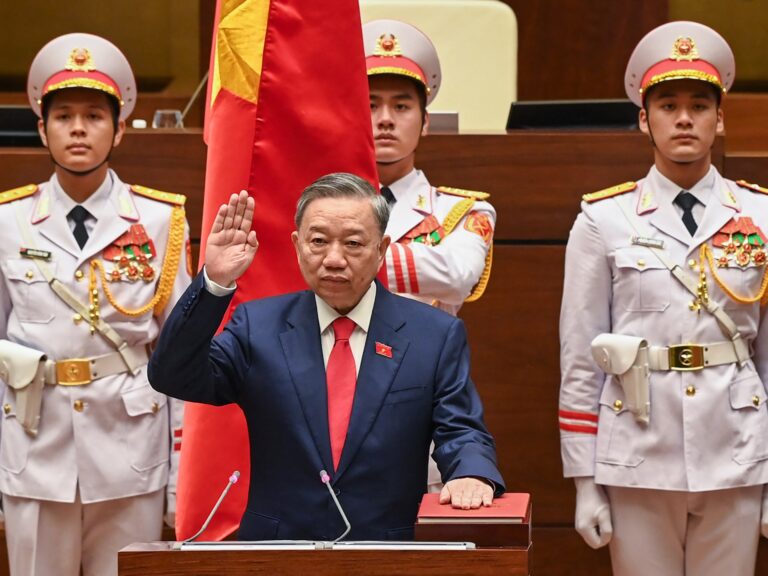Lam’s appointment comes after a major anti-corruption campaign that analysts say he has used as a weapon for his own benefit.
Vietnam’s parliament has rubber-stamped Public Security Minister To Lam as the country’s new president after a major anti-corruption campaign forced his predecessor to resign.
Following standard procedures in the one-party state, the National Assembly unanimously passed a resolution approving the election of Lam, 66, after a secret ballot in which he was the only candidate for the post. The vote followed its nomination by the ruling Communist Party last week.
Thousands of people – including several top government and business leaders – have been caught up in a sweeping crackdown on corruption known as the “firing furnace”, in which Lam, who is deputy director of the anti-corruption steering committee, played a central role.
Lam succeeds Vo Van Thuong, who resigned in March over what the party called “violations and shortcomings” after just one year in the role. The following month, the President of the National Assembly also resigned for “violations and shortcomings“.
Analysts said Lam, who is deputy head of the anti-corruption steering committee, used his investigations as a weapon to eliminate his political rivals.
In his first remarks after being confirmed as president, he told parliament that he would “resolutely and persistently pursue the fight against corruption.”
“Springboard”
The state president plays a largely ceremonial role, but occupies one of the country’s four main political offices, known as the “four pillars.” The others are the party leader, the Prime Minister and the Speaker of Parliament.
Carl Thayer, an emeritus professor and Vietnam expert at the Australian Defense Force Academy in Canberra, said the election should restore some calm, albeit temporarily. Aging party leader Nguyen Phu Trong’s third five-year term ends in 2026 – or sooner if he resigns before his term expires.
“To Lam could use his position as one of the ‘four pillars’ as a springboard to become secretary-general,” Thayer said, referring to the post of party leader.
“With the elevation to the post of president, it becomes clear that To Lam has more ambitions than retirement,” said Florian Feyerabend, Vietnam representative of the German Konrad Adenauer Foundation, a think tank, noting that the position could be a “launching pad” to secure his position as party leader.
Feyerabend said continued infighting was “the modus operandi of the system” and would likely continue until Nguyen Phu Trong’s successor was chosen.
Lam’s ascension was not without controversy, and parliament decided that he would not remain as public security minister, charged with controlling dissent and monitoring dictatorship activists.
Rights advocates say the government has stepped up a crackdown on civil society groups in recent years, and Vietnamese rights organization The 88 Project says 200 activists are currently in prison.
No longer head of the Ministry of Public Security, Lam “could be in a weaker position to unseat Pham Minh Chinh,” the prime minister and only other candidate for secretary-general, said Zachary Abuza, a professor at the National War School. in Washington.
Lam also sparked anger in Vietnam in 2021 when celebrity chef Nusret Gokce, known as “Salt Bae”, uploaded a video of Lam eating a gold-encrusted steak at his London restaurant, while Vietnam was under lockdown due to COVID-19. The video went viral before the Turkish leader deleted it.
A noodle vendor who later posted a video imitating “Salt Bae” by sprinkling herbs on noodle soup was sentenced to five years in prison for “anti-state propaganda.”


